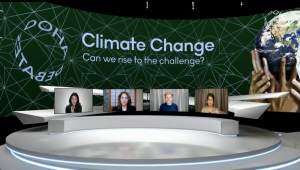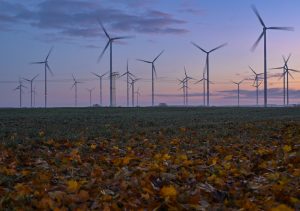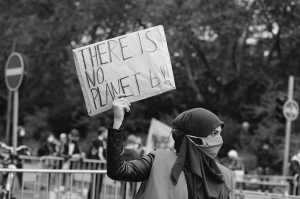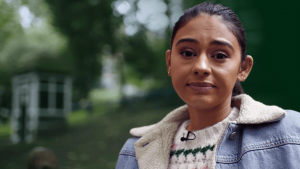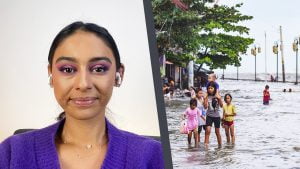With climate change on everybody’s minds, three speakers sought solutions and common ground
by Laura M. Browning
Is climate change the end of the world? Can panic beget action? Are renewables really the solution? Our three speakers address these questions and more in a debate on how to best solve climate change.
The positions
Naomi Klein: It’s now or never: We must rein in capitalism and fight the climate crisis and poverty at the same time.
Bjorn Lomborg: Stop media-fueled alarmism. Climate change is real, but it’s not the end of the world. To fix it, let’s put spending into green innovation.
Ameenah Gurib-Fakim: Be realistic — revolutionary change and green tech aren’t necessarily tenable solutions for the global south — but demand fair policies and reduce emissions immediately.
Climate Change: Can we rise to the challenge?
With COP26 in full swing, Doha Debates’ 11th debate turned to the question the world is asking: What’s the best way to solve climate change? The three speakers struggled to find common ground amid lively discussion about prioritizing solutions to climate change and balancing the human and economic costs.
Naomi Klein: Now or never, rein in capitalism
Naomi Klein: It’s now or never, rein in capitalism
Naomi Klein, award-winning journalist and author, said that solving climate change requires a multi-pronged approach that reins in capitalism, reduces global north consumerism and battles poverty at the same time. There’s no quick fix or simple solution, she argued — instead, “our moment calls for holistic and systemic solutions” that are “designed to meet the basic needs of all while radically lowering emissions — ones that do not gamble the lives of billions on capitalist shell games.” She said that the climate justice movement has a vision and concrete ideas, like a commitment to green public schools in the poorest neighborhoods first, Indigenous-owned and -led renewable energy efforts and rich countries paying their climate debts.
Bjorn Lomborg: Stop alarmism, let’s innovate.
Bjorn Lomborg: Stop alarmism, let’s innovate
Bjorn Lomborg, author and president of the Copenhagen Consensus Center, immediately countered Naomi, saying, “It’s really simple” — climate change is real, and yes, it needs to be addressed, but it’s “not the end of the world.” Blaming “relentless” media hype for fueling a false sense of urgency, Bjorn said that, “in the 1920s, about half a million people died” climate-related deaths; since then, those deaths have “declined … by 99%.” [Editor’s note: Doha Debates was unable to independently confirm these statistics, which Bjorn has written about more extensively in an article titled “Welfare in the 21st century: Increasing development, reducing inequality, the impact of climate change, and the cost of climate policies.”] Bjorn argued that, historically, innovation has solved every problem that humanity has faced, and climate change is no different. “The current approach keeps failing,” he said, and “we need a better way. And that way is green innovation.” He proposed dramatically increasing spending on renewables in order to make renewable energy globally cheaper than fossil fuels.
Ameenah Gurib-Fakim: Be realistic, but demand fairer policies.
Ameenah Gurib-Fakim: Be realistic, but demand fairer policies
Ameenah Gurib-Fakim, a biodiversity scientist and former president of Mauritius, centered the burdens that the countries in the global south are shouldering, saying, “Extractive industries keep digging out resources recklessly, destroying the forests in the global south, the lungs of our world.” A sustainable world requires an immediate reduction in greenhouse gas emissions, but it also requires that we tackle greed and inequality on a global scale. We must also curb the extraction of precious resources that serve the interests of the global north while polluting the global south. Finding a middle road between Naomi and Bjorn’s positions, Ameenah said that stopping extraction altogether was unrealistic, but so was a complete switch to renewables. She called for an immediate global reduction in greenhouse gas emissions, but also admitted that she was not especially optimistic that the burden on poorer countries would be alleviated any time soon, asking, “Can the global south ever expect decent compensation?”
Correspondent Nelufar Hedayat was live from COP26 in Glasgow, Scotland, where she shared comments from online viewers. One person from rural Scotland said that the circumstances of his life and geography meant that he couldn’t give up his diesel car — but that this issue shouldn’t be on the public to solve. Other comments echoed this, calling out the pollution of poorer countries by richer ones, and the lack of “sincere effort” by large corporations to meaningfully address their own climate policies.

Correspondent Nelufar Hedayat reported live from COP26 in Glasgow, sharing questions and comments from our online audience.
The first vote
Moderator Ghida Fakhry introduced the first round of voting by the virtual voting panel. Each voter had 100 points to distribute to the speakers as they saw fit, whether that meant assigning all points to one speaker or dividing them up among two or three. Naomi had a slim lead in the first vote, with 39%. Ameenah and Bjorn were nearly neck and neck, with 31% and 30% of the vote, respectively.

The results of the first vote.
The Majlis
In the Majlis, a traditional Arab consensus-building format, Ghida opened up the conversation among the three speakers. To Naomi, she asked, “You want to dismantle the entire system. Do we have the luxury of time?” Naomi called that a misrepresentation: It’s not about dismantling the system before any meaningful action on climate change can happen, it’s about “standing up to the people who are blocking [the solutions]” so that people can reclaim their democracies from capitalism. Naomi also addressed Bjorn, saying that his decades-long insistence that we shouldn’t panic was harming people — a “predatory delay,” she said.
Bjorn, a self-described “data guy,” doubled down on his position that climate change was “by no means the end of the world.” It’s true that extreme heat from climate change has caused deaths, but, he said, but focusing on that statistic obscures that we’ve also used technology save lives — like making the coal industry safer, or lifting billions out of poverty.
Ghida asked Ameenah, “You know what it takes to make change happen. Do we change the rules of the game, or do we innovate?” Ameenah responded with another question: “Who is actually going to make these changes?” Innovation, she said, would make a difference, but the damage caused by climate change is still happening mostly in the global south, and the global north is not “even paying tax money to the countries where they are extracting the resources.” While she didn’t argue with the substance of Naomi’s plan to rein in capitalism, she asked who would be responsible for actually doing it.

Journalist Ghida Fakhry moderated the debate.
The connector
Dr. Govinda Clayton had the difficult task of finding common ground among the speakers, who, in some cases, held opposing viewpoints and seemed unwilling to yield their beliefs. He began by saying that all three speakers agreed that climate change is a reality, that it’s causing problems and that it requires a solution. None of the speakers were particularly hopeful that the COP26 conference would result in action; furthermore, everybody had solutions that they believed would benefit the global populace, not just a few countries or a few interests. He challenged Naomi and Bjorn to find specific solutions that they could agree on, and asked Ameenah what elements from the other two speakers she agreed with.
Ameenah challenged Bjorn’s fundamental beliefs, saying, “We cannot solve an emergency until we treat it as an emergency.” Furthermore, the global south “can only innovate when we have the means to do so.” She called again for countries and companies to pay taxes in the global south, and for countries to learn to cooperate and “go beyond this colonial attitude” in order to prevent the forced migration of billions of people.
Bjorn responded that calling climate change an emergency just results in panic, which is inevitably followed by inaction. The only way forward is innovation and adaptation, he argued, which will let people not only survive, but thrive. “Africa wants adaptation,” he said, and since “most countries want to lift people out of poverty,” that should be our leaders’ main focus. He seemed to agree with Naomi that the solution should be multi-pronged, saying that “we can walk and chew gum … at [the same] time.” But trying to tackle a slew of issues at once — like the Green New Deal attempts to do — is ultimately ineffective.
The debate became spirited, with Naomi and Ameenah challenging Bjorn to see climate change as a crisis, and Bjorn challenging them to focus on adaptation and technology. Naomi and Ameenah both agreed that given recent efforts to distribute the COVID-19 vaccine in the global south — which have largely been blocked because, in Naomi’s words, “we put profit over people” — we can’t rely on the global north to develop and distribute the kind of green innovation Bjorn was proposing. Bjorn called that “absolutely ridiculous.”
Audience questions
Bjorn was asked, “What does climate justice look like to you?” Although he “wouldn’t call it that,” he said, he agreed that we absolutely need to lift people out of poverty, which he argued is a more urgent problem than climate change. He also agreed that it would be “outrageous” if the global south had to assume costs of innovation and technology.
Naomi was asked if fighting climate change “requires breaking every rule in the capitalist book … what economic system are we left with?” She responded that climate change is effectively a class war perpetuated by the top 10% richest in the world, and while reining in that capital is a big part of the solution, the global north as a whole needs to consume much, much less.
Ameenah was asked whether sustainable energy was really a viable solution in the global south. She said that it was often “trumpeted as the only way forward,” but it came with its own challenges, particularly in the global south. It requires access to technologies and other resources, and the problem, she said, is “how are we going to get there, by what means and, more importantly, is it going to serve us all?”
The second vote
Nelufar reported that Naomi’s argument seemed to have gained the most traction online, though Bjorn and Ameenah also had enthusiastic support from viewers. The second vote was nearly identical to the first, with Naomi again earning 39%, but with Ameenah taking a lead over Bjorn at 33%, and Bjorn losing some support at 28%.

Climate Change: Can we rise to the challenge? Doha Debates’ virtual debate on climate change took place during COP26, on November 4, 2021.
Ghida ended the debate by asking each speaker what steps should young people be taking right now. Naomi said, “young people are already doing so much right now … It’s the rest of us who should be joining them.” We must “respect their fear and outrage.”
Bjorn responded to people who were afraid for their future by suggesting that examining data would lead them out of fear. He also said that we must face the fact that our current approaches aren’t working — “so let’s focus on innovation.”
Ameenah deeply shared the concern of young people, saying “they feel rudderless.” She said the average age gap in Africa between youth and the leaders was 50-plus years, and that the younger generation’s fears are not being addressed. She ended with a provocative statement that again centered the global south: “The reason we’re having this debate today is because the effects of climate change are being felt in the global north.”
Watch the full debate
Climate Change: Can we rise to the challenge?




